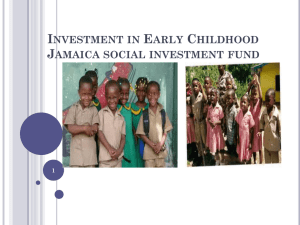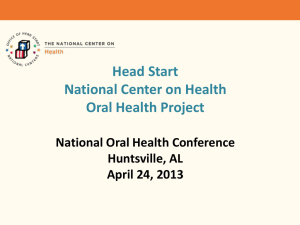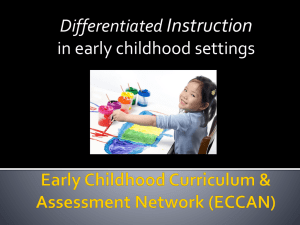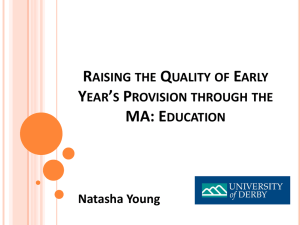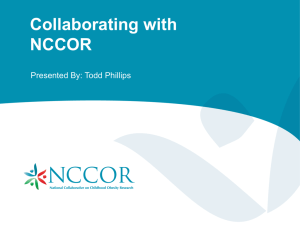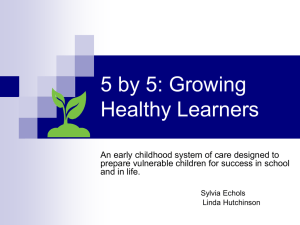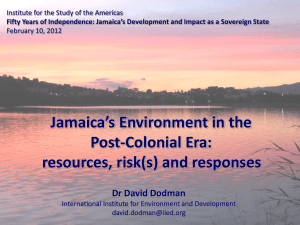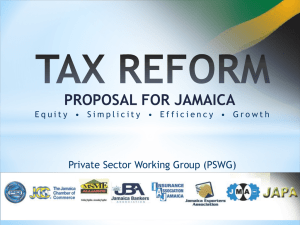United Way Presentation - The Early Childhood Commission
advertisement
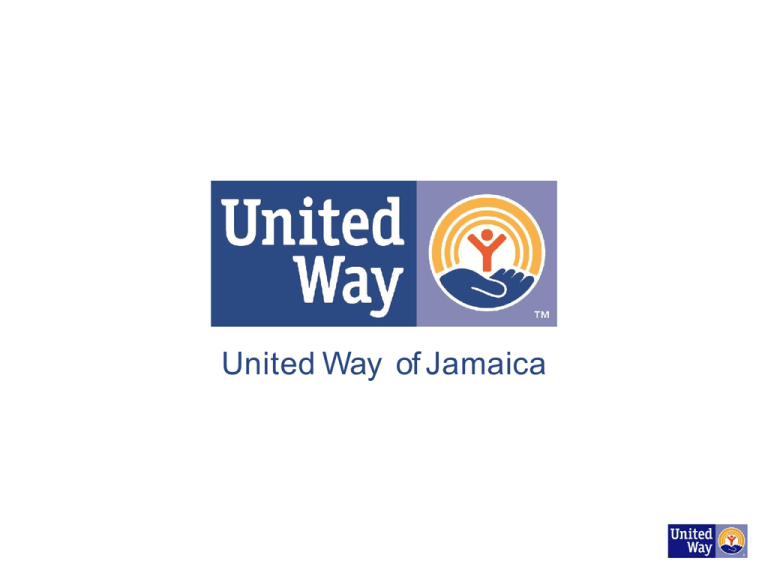
United Way of Jamaica History • Since its inception in 1985, The United Way of Jamaica has been investing in early childhood education by funding various programmes and projects across the island and partnering with its stakeholders to address safety, security and nutritional concerns of many Early Childhood Institutions(ECI). • In Manchester and Clarendon, 19 early childhood institutions received assistance to upgrade building and playground facilities, install security fencing, renovate canteen and sanitary facilities, since 2000. History • To date, a total of 250 ECI’s received fire safety equipment through United Way’s partnership with: - Jamaica Public Service - GraceKennedy Foundation - Jamaica Producers Group - Usain Bolt Foundation History • The Women’s Leadership Initiative (WLI), a committee of the United Way of Jamaica, has adopted and upgraded the VOUCH/Sylvia Foote basic school, library and recreational areas. • Further, members of WLI regularly conduct reading days with the children • Additionally they fund the salary of a special education teacher. The United Way (UW) Community Impact model Rather than raising funds and disbursing them to agencies that respond to local community needs, United Way’s new community impact approach seeks to address the causes of systemic community problems rather than just treating their symptoms. United Way does this by bringing community actors together to identify priority issues, analyze the root causes of those issues and develop and carry out strategies that address those root causes, thus altering the conditions that impact lives. UW will now become an agent for change: a catalyst, a convener and/or a collaborator. The United Way (UW) Community Impact model This model arose because while community agencies do good work individually, they are not in a position to address underlying community conditions on their own, and are now being asked to collaborate with each other on joint strategies, while sometimes competing for funding. New and different skills will be required to bring together government, business, and community NGO,s who probably never worked together on common issues. United Way is well placed to catalyze this activity. United Way Business Model How United Ways support community impact strategies Develop & implement education, income & health impact strategies that improve lives Understand partner’s interests; and build ongoing relationships with them Frame strategies and connect them to partner’s interests/aspirations 6 Impact Model Development Process • ISSUE IDENTIFICATION – Engage with the community, including partners, to identify pressing community issues; select issues for United Way involvement. • STRATEGY DEVELOPMENT – Establish target outcomes; research and develop strategies to achieve them; identify United Way’s and other partners’ roles. • IMPLEMENTATION PLAN – Set milestones; fundraising goals based on financial forecast; incorporate into resource development plan; create communication plan. • EVALUATION – Evaluate progress and results; coursecorrect as necessary. The Project • The United Way of Jamaica (UWJ) has made Early Childhood Education one of its priorities and is committed to bringing together contributors, providers, planners and other stakeholders to ensure that the best resources and facilities are available for our children’s learning and development. Why start with Education? Mastery of literacy at Grade 4 is only 62% Internationally Jamaica ranks 129th out of 205 in literacy 70% of adults do not have the required skills for job training Education = Economic Development “Investment in human capital breeds not only economic success for those being educated, but also for the overall economy.” -- Arthur J. Rolnick, senior vice president and director of research, Federal Reserve Bank Why Early Childhood Education? • Primary Education is a UN Millennium Goal. • • Global Citizens Care about Education. • • 48% of global consumers support the Primary Education Goal Strategic priority in Vision 2030 development plan. • • Ensure that, by 2015, children everywhere, boys and girls alike, will be able to complete a full course of primary schooling. Establish world class education and training Women/Mothers in Particular Care about Education. • Education and health are #1 rated causes among mothers globally. Source: IModerate Research, September 2011 Return On Investment (ROI) Is Strong in Early Learning Policymakers should invest in young children, where the return on investment is stronger than in low-skill adults. Nobel Laureate, James Heckman Why Early Childhood Education? Early learning influences long-term success and gives high returns Quality Early Learning REDUCES • Crime Rates • Teenage Pregnancy • Welfare Dependency • Job Training Costs • Special Education Cost • Grade Repetition Quality Early Learning INCREASES • Success in School • Graduation Rates • Workforce Readiness • Job Productivity • Community Engagement Many studies document a return to society of more than $ 17 for every dollar invested in early child care and education programs. A.Rolnick: Perry Preschool Programme 2004 Why Early Childhood education? Some children start behind and never catch up however Studies show that simple psychosocial stimulation in early childhood can compensate for developmental delays and reduce social inequality in later life. Why Early Childhood Education? • Improved labour market outcomes • A recently concluded 20- year World Bank study in Jamaica showed that EC stimulation resulted in a 42% increase in the earning power of stunted children compared to a control group. Source: 2013 World Bank follow up study,2013 • United Way Worldwide regional project • The Inter-American Development Bank and United Way Worldwide recently signed an agreement to promote programmes and projects aimed at improving early childhood development in the Latin American and Caribbean Region. The Issue • Although enrollment in Early Childhood institutions in Jamaica is high, the learning experience is very poor. • One of the major challenges for early childhood education is the lack of trained teachers, as only 29% of the 9000 practitioners are qualified, and 2,500+ are untrained. • Children are not being properly prepared to begin primary education, and this introduces and perpetuates costly cycles of remedial training into the educational process. The opportunity for United Way of Jamaica • Mobilize resources to improve the quality of the teachers in basic schools • Partner with Corporate entities • Partner with employees through payroll giving • Retain the trained teachers • Work in progress • Scale the program to have a national impact • Engage our volunteers islandwide . Volunteer board member participates in reading programme at Amy Bailey Basic School Volunteer board member participates in reading programme at Amy Bailey Basic School Progress to date • The UWJ’s most recent initiative is an investment of $16M by the Alcoa Foundation to provide training for 150 basic school teachers in the “Fundamentals of Early Childhood Education” over a two year period. • In addition, 150 parents will receive training to help them to assist and stimulate their children. The training is being done through the Mico University and the goal of the programme is to have a 20% increase in the number of students from Manchester and Clarendon achieving mastery in numeracy and literacy at the end of two years. Children represent 28% of our population and 100% of our future Thank You!
